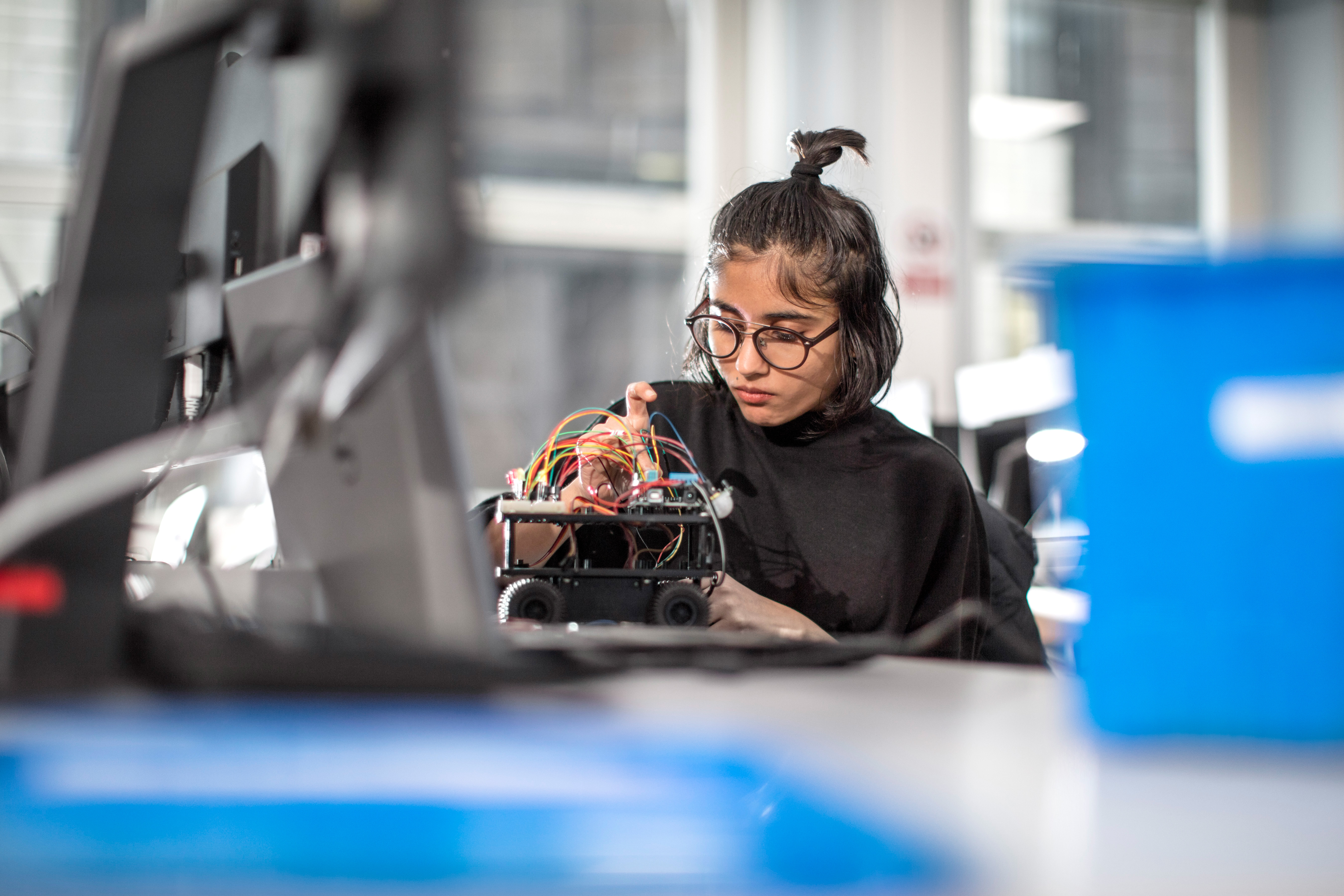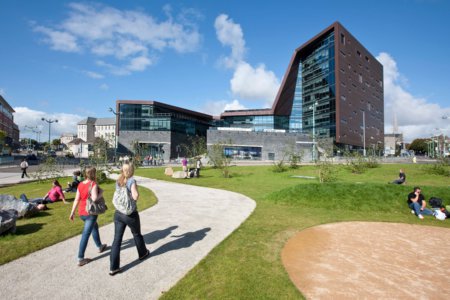Anything is possible when you have the right people supporting you. That’s how Guoste Pivoraite, an MSc Data Science and Business Analytics student, describes her experience. “The support received from my programme leader, teaching staff and tutors is exceptional, as everyone is truly understanding and always available at short notice for all queries and questions.”
Ishita Parekh agrees; as she describes the support on her MSc Robotics programme at the University of Plymouth. “I approach my lecturers frequently when I have doubts,” she says. “They are always there to listen and to help answer any questions I have.”
Both Pivoraite and Parekh are part of the postgraduate student community within the School of Engineering, Computing and Mathematics (SECaM). Upon graduation, they will soon join a legion of extraordinary students who go on to do extraordinary things. Formatively, their shared experience will be to learn with supportive experts at the top of their game, at an institution where teaching and research are of the highest quality.

The School of Engineering, Computing and Mathematics (SECaM) produces successful graduates through excellent academic support and world-class research facilities.
Source: University of Plymouth
“Part of my reason for taking the programme at the University of Plymouth was that I had a good relationship with the lecturers and knew that they had extensive knowledge within their specific disciplines,” says Ed White, an MSc Advanced Engineering Design student.
Research is just as excellent. The Supergen Offshore Renewable Energy Hub exemplifies this. Established in 2018, the hub provides research leadership to connect stakeholders, inspire innovation and maximise societal value in offshore renewable energy. Led by Professor Deborah Greaves OBE, from the University of Plymouth, the hub brings together expertise from across the Offshore Renewable Energy sector and is made up of several groups – a testament to the kind of industry-leading expertise SECaM students have the privilege to learn from. The hub also sets the scene for one of the School’s newest and most innovative Masters programmes: MSc Offshore Renewable Energy Engineering.
With such illustrious figures, it’s little wonder that the University’s research has achieved:
- Ratings of “world-leading” and “internationally excellent” in the UK government’s most recent Research Excellence Framework (REF, 2014), as well as:
- Rankings of Plymouth being named eighth in the world – and best in the UK – for the quality and impact of its research in Marine and Ocean Engineering (Shanghai Ranking Global Ranking of Academic Subjects, 2019).
Facilities that push the limits
At SECaM, state-of-the-art facilities set high standards, ensuring students achieve their best. The new Engineering and Design Facility is a strong indication of the upwards direction of the School’s ambitions. It’ll enable staff, and students alike, to engage in world-leading research; support the delivery of innovative postgraduate programmes; as well as meeting the future needs of UK industries.
“This new building will inspire the engineers of tomorrow, giving us the ultimate place to bring together students, academics and industry in an environment that not only benefits them but also society as a whole,” says Professor Greaves OBE, Head of SECaM.
https://www.youtube.com/watch?v=RVruJ9KKzDM
The Coastal, Ocean and Sediment Transport (COAST) laboratory is where MSc Coastal Engineering, MSc Offshore Renewable Energy Engineering, and MSc Advanced Engineering Design students and staff can perform physical model testing with combined waves, currents and wind, offered at scales appropriate for device testing, array testing, environmental modelling and coastal engineering.
“The University’s COAST laboratory facilities are very comprehensive and easy to access and the whole process is supported by great staff,” says Nur Roszi, MSc Coastal Engineering student. “Just simply fill out a request form with the details of your project, discuss your requirements and you will soon be beginning the magic of your research. The COAST lab has formed a huge part of my MSc dissertation project, which will go on to influence my career and hopefully benefit the environment.”
Besides the COAST lab, SECaM houses a Marine Station, Analysis and Materials Characterisation Suite, Plymouth Electron Microscopy Centre and High Performance Computing (HPC) resource centre, Robotics Laboratories, Computing Laboratories, and Cyber-SHIP Lab.
In short, if students need it, SECaM has it. “I mostly used the high-performance computers,” says White. “They have the processing power to run the engineering packages at a level that simply isn’t possible on most home PCs.”
The University is the perfect place to study; whilst Plymouth, as a city, is the perfect place to play. MSc Advanced Engineering Design student, Tom Dornom, got to experience the best of both worlds. Ideally located between the thriving city centre and the golden sandy beaches that form the picturesque coastline of South Devon, Plymouth has many perks that many student cities in the UK can’t offer.
“I love Plymouth and the city centre,” he said. “The self-contained campus makes it a great university with a fantastic coastline, lots of parks, and being on the doorstep to both the moors and Cornwall, there’s so much to do.”
For many students, that can sound like an understatement still. Nicknamed “Britain’s Ocean City,” Plymouth is popular among travellers who enjoy coastal lifestyles, the scenic beauty of nature, outdoor pursuits, as well as water-sports. Plymouth, as a city, is renowned for its exceptional hospitality, having bagged the coveted title of “the UK’s friendliest city” according to a survey measuring factors such as generosity, trust and friendship. Plymouth was also voted Best Holiday Destination in Europe by luxury travel magazine, Conde Nast Traveller, with much of the city’s popularity attributed to its superb art galleries, restaurants and cultural events.
Interested in pursuing a postgraduate programme at SECaM? Explore the variety of computing, engineering and mathematics postgraduate programmes on offer, by clicking here.
Want to study one of our Masters programmes but you don’t meet our entry requirements? The University of Plymouth International College (UPIC) may be able to help you. As an associate college of the University, they offer one semester (three month duration) pre-Masters foundation programmes – one in Engineering and one in Data & Computer Sciences – that can lead you directly onto MSc programmes within the School of Engineering, Computing and Mathematical Sciences. Our pre-Masters is a one-semester long programme (three months) focusing on three main areas:
i) Critical Thinking for Postgraduate Study;
ii) Interactive Learning Skills and Communication;
iii) Research Methods for Postgraduate Study.
More than 90% of our students complete their pre-Masters successfully, and then more than 90% go on to complete their Masters successfully! Apply online today!













